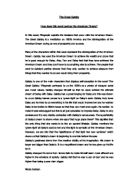Gemma Edney L6th
AS English
The Great Gatsby
“A bootlegger with gangster ‘gonnegtions’, a purveyor of sordid parties, a prime exponent of the hedonistic Jazz Age, how can Gatsby be called ‘great’?”
The title of F Scott Fitzgerald’s novel ‘The Great Gatsby’ can be seen as incredibly ironic: not only can the ‘greatness’ of the eponymous character be vehemently contested, he is not even named ‘Gatsby’. In fact, he is a criminal, James Gatz, who, although he appears to be an epitome of the idealistic American Dream, having grown from an impoverished childhood into a life of excess and splendour, he has obtained everything through crime and corruption. Indeed, it has been said that ‘The Great Gatsby’ is “a parable of disenchantment with the ‘American Dream’”, and it is, for the American Dream is the idea that “through hard work, courage and determination, one could achieve prosperity.” James Gatz did not obtain his prosperous lifestyle through “hard work”, but rather through felony. Of course, it may seem that he ‘worked hard’ for it, and there is no disputing his determination and perhaps even his courage, but the “hard work” on which the American Dream is based is not the work of criminals.
Of course, we cannot deny that Gatsby has achieved a great deal in his lifetime, all, apparently, in the name of love. Indeed the narrator of the story, Nick Carraway, describes Gatsby as having “an extraordinary gift for hope, a romantic readiness such as I have never found in any other person”, and this forms the basis of his opening argument for the greatness of Gatsby. We must, however, examine the reliability of the narrator. Nick says himself that he is “inclined to reserve all judgement”, but then quickly goes on to say how “it has a limit”, that he cannot reserve judgement on everyone, and also that Gatsby was “exempt from my reaction”, following this with how Gatsby “represented everything for which I have an unaffected scorn”, and then his flattering description. Here we see how Nick contradicts himself. He does not reserve all judgement, in fact he makes a very quick judgement of character, and does so with naivety, some could say typical of Western America. He appears to be taken in by Gatsby, by the glamour, the light, and the initial conception that Gatsby is an epitome of the American Dream. After all, Nick himself was incredibly isolated, even though he was in the city. He describes how “at the enchanted metropolitan twilight I felt a haunting loneliness”, how his house was “a small eyesore” next to the two huge mansions, in the “less fashionable” of the two Eggs of land on Long Island. He is incredibly isolated in this world, and so gets drawn in by Gatsby’s world; the house, the parties and the man himself:








